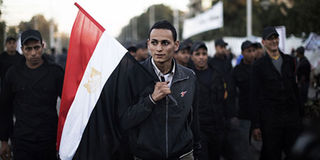Fresh protests in Egypt over Islamist-backed charter

PHOTO | MARCO LONGARI An Egyptian man holds his national flag as he walks in front of policemen on guard outside the Presidential Palace in Cairo on December 18, 2012, ahead of a planned demonstration by opposition supporters.
What you need to know:
- The opposition National Salvation Front coalition was urging Egyptians to protest against the draft constitution and denounce what it said was "rigging" in the first round of voting last weekend by Morsi's Muslim Brotherhood
- Unofficial tallies showed 57 percent of ballots counted from first-round voting in Cairo and nine other regions backed the draft charter, suggesting the text would be adopted in the second round when the other half of the country votes
- Morsi's camp argues the new charter is needed to bring stability to Egypt after months of turmoil following the early 2011 revolution that toppled veteran leader Hosni Mubarak
CAIRO
Egypt's opposition launched fresh protests on Tuesday in a last-minute bid to scuttle a draft constitution pushed by President Mohamed Morsi and his Islamist backers ahead of a second round of voting.
Hundreds of people had already begun gathering in Cairo by late afternoon ahead of the evening rallies, AFP correspondents reported.
The biggest were set for outside the presidential palace and in the capital's iconic protest hub Tahrir Square as the opposition sought to mobilise voters against the draft charter in Saturday's second leg.
They add to weeks of street unrest that have challenged Morsi's authority.
Early this month, clashes between pro- and anti-Morsi supporters killed eight people and wounded hundreds, and prompted the army to deploy troops and tanks around the palace.
The head of the military, Defence Minister General Abdel Fattah al-Sissi, warned against the nation becoming so politically polarised.
"The divisions are affecting the economy and threaten social peace, requiring of us solidarity, renouncing differences and putting public interests first," Sissi was quoted as saying.
The opposition National Salvation Front coalition was urging Egyptians to protest against the draft constitution and denounce what it said was "rigging" in the first round of voting last weekend by Morsi's Muslim Brotherhood.
"We do not agree with this constitution. We don't recognise the referendum as valid," said one opposition protester near the palace, Ayyoub Laouindi.
"The constitution is void, the referendum is void. Egyptians' voices have been falsified and the ballot boxes been stuffed," said another, Suzanne Esmat, a tourist guide.
The justice ministry responded to the opposition's fraud allegations by saying it was appointing judges to investigate.
Unofficial tallies showed 57 percent of ballots counted from first-round voting in Cairo and nine other regions backed the draft charter, suggesting the text would be adopted in the second round when the other half of the country votes.
Many of Egypt's 21,000 judges also kept up their pressure on Morsi, charging that he was trying to undermine their independence.
On Monday, the State Council Judges Club grouping nearly 1,000 top judges announced it would boycott supervision of the second round of voting. It joined an estimated 12,000 judges who already boycotted the first round.
And a protest by hundreds of prosecutors the same day forced the resignation of the prosecutor general, Talaat Ibrahim Abdallah, appointed less than a month ago by Morsi.
"This is undoubtedly a new crisis for Mohammed Morsi, showing that his decisions are not accepted by large sectors of the state system," a political science professor at Cairo University, Mustafa Kamel al-Sayyed, told AFP.
"They might have let the president get away with it, if he had made a good choice, but the person he chose (Abdallah) acted in a way giving the impression he was breaking laws and at the beck and call of the president's party," the Muslim Brotherhood's Freedom and Justice Party, Sayyed said.
Morsi's camp argues the new charter is needed to bring stability to Egypt after months of turmoil following the early 2011 revolution that toppled veteran leader Hosni Mubarak.
But the opposition is scathing of the document, which was written largely by Islamists, believing it weakens human rights protections, particularly for women, and sets the stage for a creeping advance towards Islamic sharia law.
A commentator in the newspaper Al-Masri al-Youm, Hassan Nafaa, wrote that Morsi's drive to hold the referendum "has managed to do just one thing: solidify and deepen the division between Egyptians to a dangerous and worrying degree".




